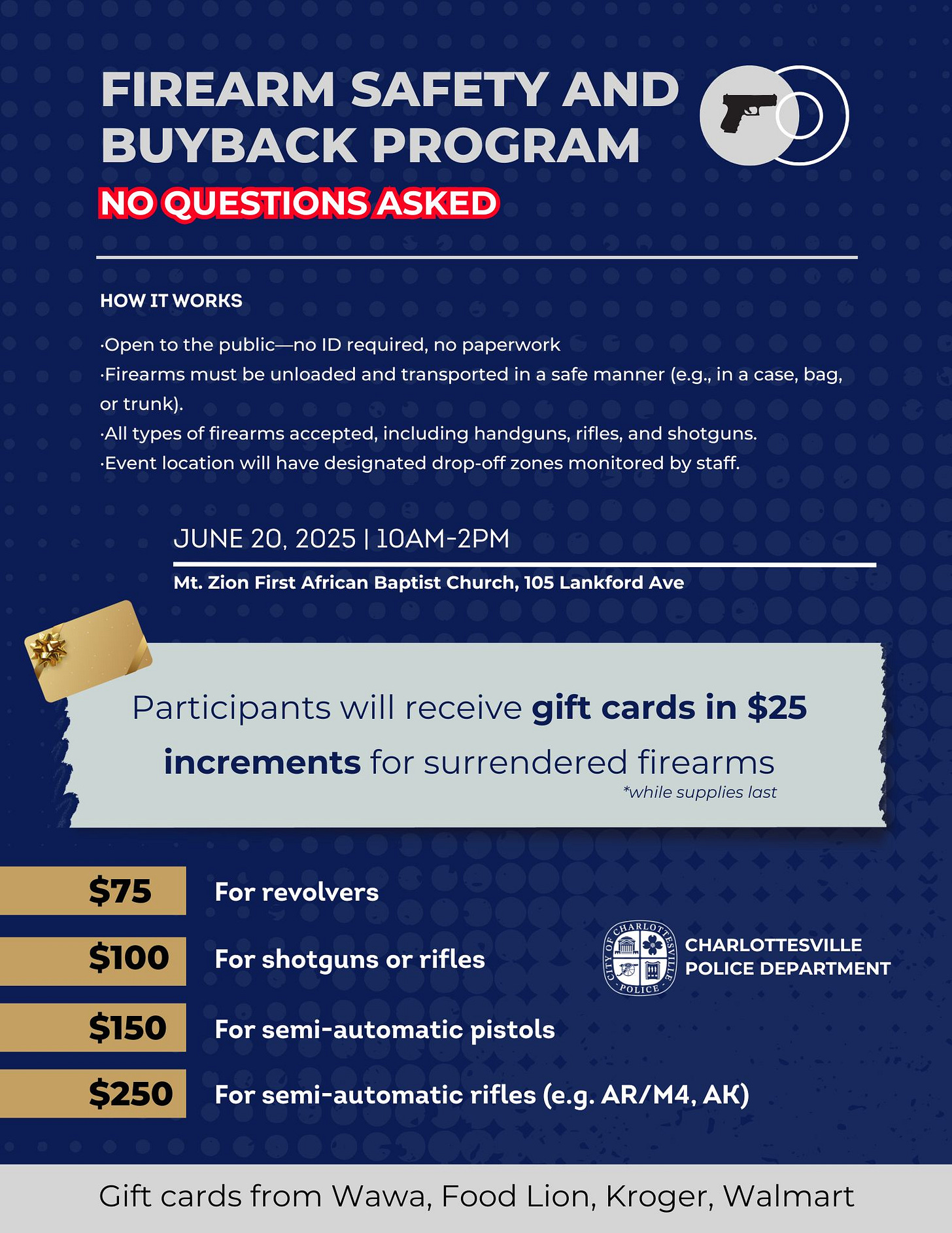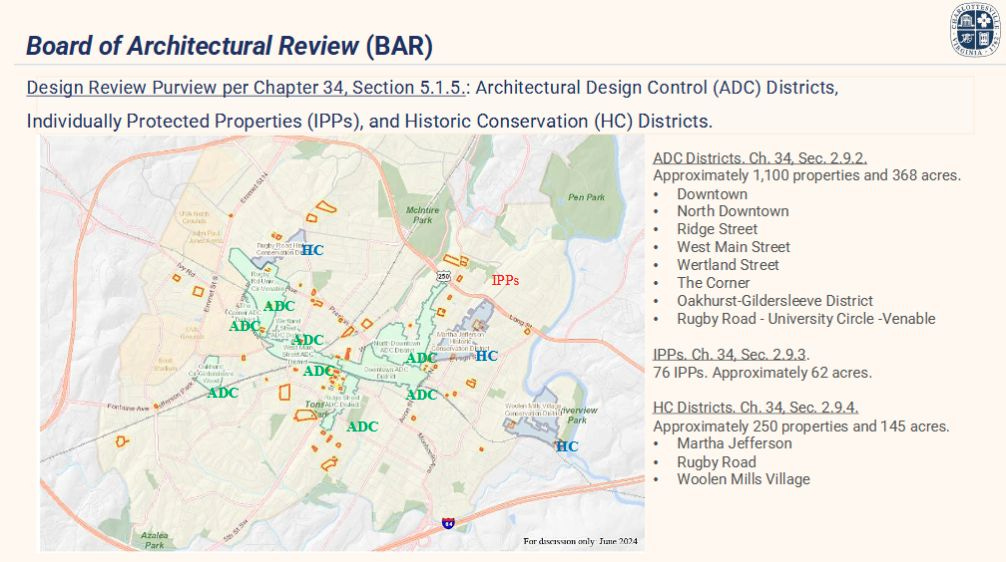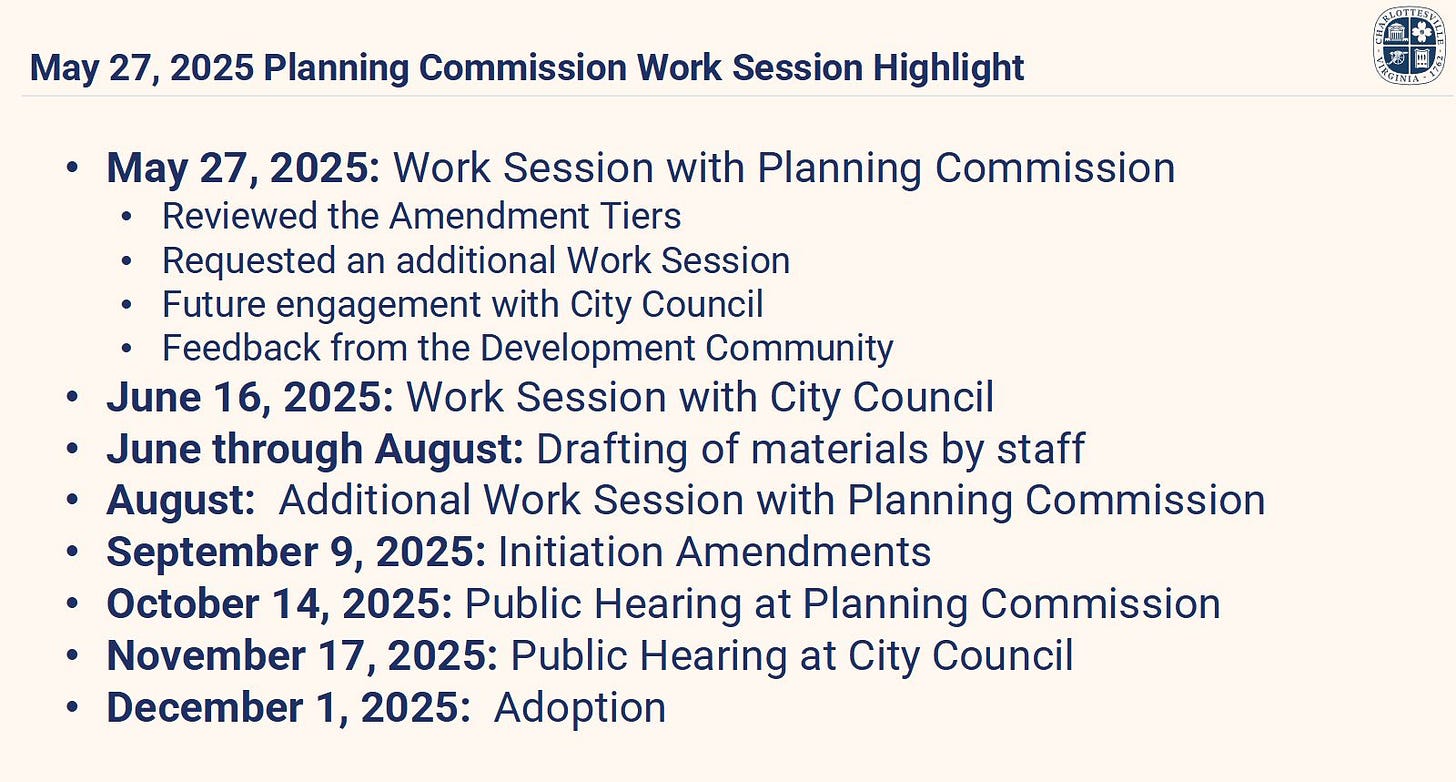June 17, 2025: Police Chief Kochis tells City Council that Peregrine software will not be used, Flock license-plate data restricted to Charlottesville’s use only
Plus: City Council gets a briefing on what city planners will do next fiscal year, including the first updates of the new zoning code
On Thursday, the United States of America will recognize Juneteenth National Independence Day. That’s the day when Union Major General Gordon Granger ordered the final enforcement of the Emancipation Proclamation in Texas. The day has been celebrated unofficially for decades and decades. President Joe Biden signed a bill on June 17, 2021 creating a federal holiday, the first new one since 1983 when President Ronald Reagan signed a law creating one for Martin Luther King Jr.
What does this have to do with Charlottesville Community Engagement? For one thing, this is a reminder that local governments are closed Thursday. I’m Sean Tubbs, and every day there’s something to look back at while I look forward to the next set of stories.
In today’s installment:
The Charlottesville Police Department have charged a second person in connection with a Saturday morning shooting that wounded one
Charlottesville Police Chief Michael Kochis briefs City Council on a decision not to use crime-analysis software and that access to Flock data is blocked from use by other Virginia localiites
Charlottesville City Council also gets a briefing on what Department of Neighborhood Development Services will do in the next year as well as a look at upcoming changes to the Development Code
First-shout: Charlottesville Area Tree Stewards seeking applicants for Fall 2025 Training Class
Do you appreciate all of the benefits that trees serve in the environment? If so, the Charlottesville Area Tree Stewards ask that you consider registering to join the Fall 2025 Training Class.
The Fall 2025 class will consist of a combination of online training sessions and field activities with a maximum of 32 students to facilitate the best field training possible. With a 15-week duration beginning August 5 and ending November 15, the online classes will precede the field activities held on every other Saturday at various locations in the Charlottesville area.
Interested? Go to the Charlottesville Area Tree Stewards website to view the complete class description and syllabus and follow the registration to Eventbrite. Questions? There’s a link to more information at the site.
Second person charged in Downtown Mall shooting early Saturday
The Charlottesville Police Department has charged a second person in connection with a shooting that took place on the Downtown Mall in the early hours of June 14.
“At approximately 1:40 a.m. [that] morning, officers patrolling on foot along the Downtown Mall heard multiple gunshots near Fitzroy,” reads an information release that went out that day.
“Officers immediately responded and located a 30-year-old male suffering from a gunshot wound to the leg.”
The victim was transported to the UVA Medical Center and is expected to recover.
Within hours, police arrested Lorenzo McAllister, 34, and charged him with reckless handling of a firearm, possession of a concealed firearm, and discharging a firearm within 1,000 feet of a school.
The initial release stated a second person was believed to be involved. Today, police charged 28-year-old Tylek Wade Burley with malicious wounding, use of a firearm in commission of a felony, and possession of a firearm by a felon. He has not been arrested.
People with information are asked to contact Detective Aguilera at (434) 970-3882 or call the Crime Stoppers Tip Line at (434) 977-4000 to remain anonymous.
The June 14 incident was the second of the month in the downtown area to take place late at night. Police have increased patrols and coordination with the Virginia Alcoholic Beverage Control Authority given that both incidents took place near licensed establishments.
“You have a lot of individuals carrying firearms in establishments, drinking alcohol,” said Charlottesville Police Michael Kochis. “Some look like they may be overcrowded. And when they empty out around 1:40 a.m. or 1:30 a.m., emotions run high. And if you have firearms, we've seen what's happened.”
Kochis said there will be conversations with business owners about how to create more safe environments. In the meantime there will be a stronger police presence on weekend nights.
Charlottesville Police have paused use of Peregrine software, not sharing Flock data
Earlier this year, members of City Council expressed concern about the use of software to help Charlottesville Police Department analyze crime data. The city was to have received $150,000 from the Virginia Department of Criminal Justice Services as part of Attorney General Jason Miyares’ Operation Ceasefire program.
Charlottesville Police Chief Michael Kochis told Council that his department will not use the Peregrine software.
“We're not going to be using it at this point,” Kochis said. “We had a grant that was accepted by this body, but after hearing some things and some concerns, we're going to hold off on using Peregrine.”
Kochis also said that the city has stopped sharing surveillance data collected through ten cameras connected to the Flock network. That’s because the data could conceivably be used by other Virginia localities to assist with enforcement of federal immigration laws under a program known as 287(g). (learn more)
“That is a federal program that allows local jurisdictions to do immigration enforcement,” Kochis said. “There are 13 of them in Virginia. Some of them are near here. And so because of that and the possibility that they could be doing enforcement with Flock if they have access to it, we have also shut off to all local jurisdictions within the Commonwealth of Virginia.
Kochis said Charlottesville is the only locality in Virginia to have done so. He added that means that the system is not accessible to this community and so any cases that originate here will not be able to use license plate data to locate suspects. He did say the cameras are still active and can be used for local cases.
Kochis had other updates as well.
At the tail end of the school year, the City of Charlottesville began using speed cameras in certain elementary school zones.
“We did our first week trial of that for over about 10 days and over that time we just gave out warnings,” said Charlottesville Police Chief Michael Kochis. “But in that short period of time there were 181 warnings issued. In the fall, those will be real tickets.”
The speed limit in those zones is 15 miles per hour.
Kochis also commended Indivisible Charlottesville as well those who attended the No Kings rally on Saturday for how they conducted themselves during the protest.
“I think they counted somewhere around 6,000 folks that showed up,” Kochis said. “I was in the command center and I think it's a model on how these things really do go. And I couldn't be more proud of the community for stepping up and showing how to do this the right way.”
Kochis also put in a plug for a gun buyback program that is taking place this Saturday from 10 a.m. to 2 p.m. at Mount Zion First African Baptist Church.
Charlottesville City Council debuts new meeting management tool
At the June 16, 2025 meeting of the Charlottesville City Council, Councilors used for the first time a new system to run meetings.
Longtime observers of City Council might recall that a voting board was on the stage right side of the City Council dais. This displayed how each of the five elected officials voted on matters. That system has now been replaced with a computerized system that displays results on two computer screens.
The system was not working at the beginning of the meeting and so a series of voice votes were taken until the controls were more familiar.
I’ll have more from City Council in future editions of the newsletter. I’ve sent some questions to the city for more background information on the need for this new system and how much it cost.
Second shout-out: Alliance Française de Charlottesville
The Alliance Française de Charlottesville promotes the French language and francophone culture through educational and cultural programs. Visit the Alliance Française website to learn more about group classes, private lessons, cultural events, and social activities for both kids and adults.
City Council briefed on Neighborhood Development Services work plan, forthcoming zoning changes
For the second time since becoming the director of Charlottesville’s Department of Neighborhood Development Services, Kellie Brown has appeared before the City Council to give an overview of what her team will do in the next fiscal year. She started with an overview.
“Neighborhood Development Services is dedicated to creating a sustainable and vibrant community,” Brown said. “We are made up of eight program areas. Zoning, building inspections, development services, property maintenance really fall within our code compliance area focus.”
Since her last appearance on January 21 of this year, the city has hired a long range planning manager and a long range senior planner.
“They're both part of our team now,” Brown said. “We have a new permit technician. We are still recruiting for a student housing property maintenance inspector, but we have a transit planner on board as well. And we've also been continuing to focus on staff development and training with a number of certifications for our building inspection and property maintenance team.”
There are two openings in NDS at the moment including a zoning inspector to focus on properties used for short-term rentals. The other is someone to work on tree preservation and tree removal permits.
In July, the city’s housing programs will also move underneath NDS now that the Office of Community Solutions has been dissolved. Read that story here.
Toward the beginning of her presentation, Brown showed a new Development Map that allows people to visually search for development projects. This is part of the effort to better explain the new Development Code to community members. Brown used the map to show Council that there are a lot of building inspections that need to occur and permits to be reviewed.
“We are looking at opportunities to increase the capacity of that group through a temporary plan reviewer,” Brown said. “That's something that's under review by staff right now.”
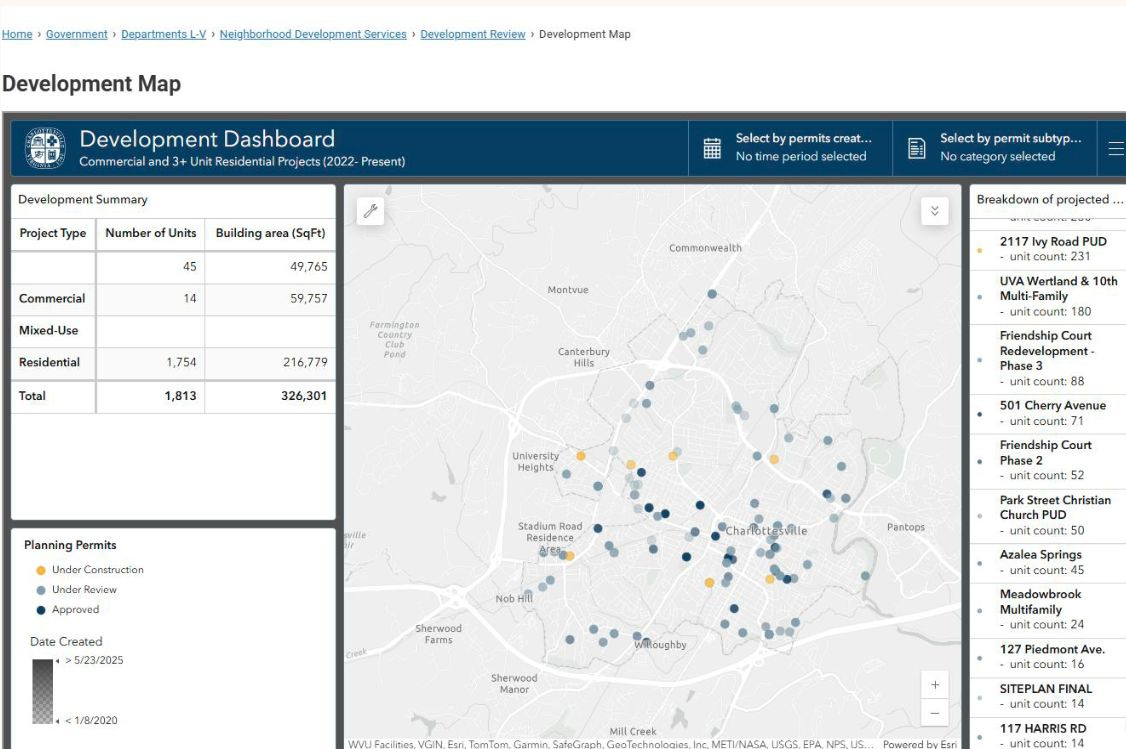
Brown said that before NDS embarks on any new initiatives not already considered, the department has to focus on the core of its work which is to enforce the Building Code, Property Maintenance Code, development plan review, historic preservation, and zoning enforcement.
“We also are prioritizing new efforts that also are in support of health and safety and then also the implementation of the new development code,” Brown said.
This summer the scoping will be completed on a two-year study to look at the city’s rules to protect natural resources. Brown said this will be an attempt to balance out sustainability goals with the city’s goal to build more housing.
“What are the real issues that we face?” Brown asked. “What are the key problems that we need to solve? We're looking at, you know, how we balance the community vision for healthy air, water and ecosystems, as well as high quality and accessible open space in natural areas and a preserved and enhanced tree canopy with our goals for housing as well.”
City Councilor Michael Payne said he was nervous about removing too many protections and said he did not think environmental regulations were stopping the production of new housing. For instance he said the city should not permit development in floodplains.
“I just worry if we get the balance wrong, we're really going to be regretting decisions we made in 20 years if a tropical storm makes a direct impact, you know, straight through central Virginia,” Payne said.
Brown said the study could possibly call for a need to strengthen regulations, but NDS has to go through the work first. A key area of review will be on stormwater management and whether there can be more flexibility.
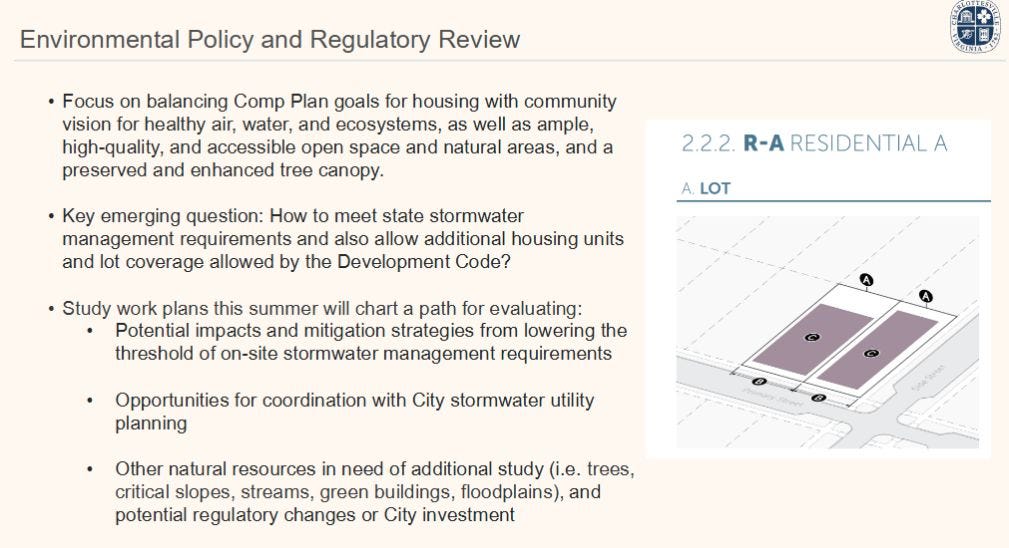
Another initiative in the next year will be a “visioning process” for the Rose Hill and Tenth and Page neighborhoods. Portions of both are designated in the Comprehensive Plan as “Sensitive Communities” that have some protections in the zoning code. When the new rules were adopted, the idea was to create small area plans for both.
“We are in the initial process, really right now, kind of organizing ourselves, establishing those relationships with community members, preparing materials on what are the existing conditions in these neighborhoods that can help community members provide to us, you know, what they envision as the future for their communities and, excuse me, for their neighborhoods,” Brown said.
Brown said the process will begin in the second half of 2025 with recommendations expected in the first half of 2026. She said the plan will be on a short-term planning horizon and one of the questions will be on what residents think of the Residential-Neighborhood A zoning.
“That RNA zoning… really limits the development reinvestment potential in those neighborhoods,” Brown said. “ It doesn't allow for the same number of units as in other neighborhoods. That is actually something where we want feedback from the community.”
However, the visioning process itself will not include making any changes. That would wait until further review of the development code under what NDS staff would called a “Tier 3” change.
Mayor Juandiego Wade said he wanted to know more about those engagement efforts because he said many people refuse to participate.
“What I found, particularly in 10th and Page, is that when I walk over there, it's like half dozen people that sits on the porch that won't attend any meeting
One initiative underway now is a study of short-term rentals with a survey that closes on June 30. She said the ordinance that allows short rentals now is over ten years old and feedback from the survey could inform amendments.
“We will be bringing forward our findings and our recommendations later this year,” Brown said. “We are hoping to bring forward recommendations for amendments to ordinance by the end of the year.”
In the meantime, enforcement efforts will step up against those who are not in compliance.
Another item for my review will be a review of the city’s architectural-design control district and entrance corridor which Brown said have not been scrutinized for some time. One possible outcome is to reduce the workload of the Board of Architectural Review and the Entrance Corridor Review Board.
“They have not been looked at in a while,” Brown said. “And in that intervening time, we have adopted a new development code. And there certainly are questions about whether there are conflicts or, you know, consistency between the design guidelines and the development code.”
Council gets a look at zoning proposals
Brown then handed over the podium to Matt Alfele, the Development Planning Manager for the city’s Department of Neighborhood Development Services. He gave a similar presentation to the one the Planning Commission received in late May on potential changes to that development code. (read the story from the PC meeting)
Alfele had statistics on how the development code has been utilized so far.
“We've had 90 pre-application meetings in just over a year using the new development code,” Alfele said. “But as you can also see, out of those 90 pre-application meetings we've only had 20 projects move forward. And of those 20 projects that have moved forward, we've only had four projects that have received approval.”
Alfele went through several projects that are underway, projects that have all been reported in this newsletter. That includes 2030 Barracks Road where 24 units are envisioned on land zoned residential.
“This means we are seeing some missing middle housing emerge from these projects,” Alfele said. “However… significant challenges arise during the review process. Obstacles such as closing a public street, navigating discretionary approvals to modify development standards, and addressing utility service upgrades are providing key hurdles to moving these projects forward and eventually into construction.
In the case of 2030 Barracks Road, the developer needed to get an administrative modification from the Board of Zoning Appeals and Council must grant a special exception from a requirement that all buildings face the primary street.
There was no discussion of the ongoing lawsuit seeking to overturn the zoning code. A jury trial is scheduled for June 2026. The defense filed a new motion today and there is a hearing set for June 30 to address the plaintiff’s recent motion seeking a default. Read more in this story.
One member of the public appeared at public comment on June 16 to express concern.
“I’m a little concerned that we missed the filing on the zoning case and I’m hoping that will be taken care of,” said Chris Meyer. “I know there are a lot of people who want to build more housing in this community, myself being one of them, and not having certainty in the zoning code and the update in place is very disconcerting.”
Meyer is behind a project at 117 Harris Road which would see an 0.821 acre lot subdivided into two lots with seven units to be constructed on each for a total of 14 rental units. The existing house built in 1957 would remain on one lot. A second submission was made on May 15 following an initial denial.
More on this process as it develops. Any questions? Ask in the comments!
Reading material:
Dollars or data likely motivated Albemarle County cyber incident, UVA expert says, Avery Davis, WVIR 29News, June 13, 2025
School board votes to extend Haas' contract until 2028, CBS19 News, June 16, 2025
Louisa County landowner caught up in solar farm regulation debate, Shannon Heckt, Virginia Mercury, June 17, 2025
Time for #881 to enter the adding machine
I’ll keep this one short as I want to get right into writing the next one. The next one is a Fifth District Community Engagement newsletter that I want to get out today. That will be three newsletters published in one day!
I get more prolific the more I go. Every single day I try out a new trick. I want to keep getting better at this.
I also want to try my hand at telling different stories, too. It’s my hope that within a year I’ll have the beginnings of an editorial team. I do not know how I will make that happen, but five years ago I had no idea how to get back to this work.
I want to thank all paid subscribers for their support. There are several of you who are still owed a personalized thank you. I’m behind in that, but I’m behind with a lot of other things, too.
This week I will also hopefully be selling the first “sponsorship” packages that I hope will bring in more revenue. I’ve got two businesses lined up.
I got down this week because one of my colleagues in Georgia who does something a lot like this newsletter recently opted to end operations. I was really impressed with what the Henry Reporter was doing. A one-person mission to get people information about transportation projects!
So when I found out he was ending things, my mood was affected. There is also the matter that I always feel wonky the week before the summer solstice. I also seem to work a lot, too.
But I’m glad to do this. Perhaps others have written about all you see in today’s edition. But I know many of you have come to rely on me doing this work, and that’s a trust I will maintain as long as I can. It looks like that’s going to be for quite a bit, because I want to find out what happens!
Stick with me, and you will as well.
I don’t exactly recommend the music today, but gosh do I love it!





